 Petzlover
Petzlover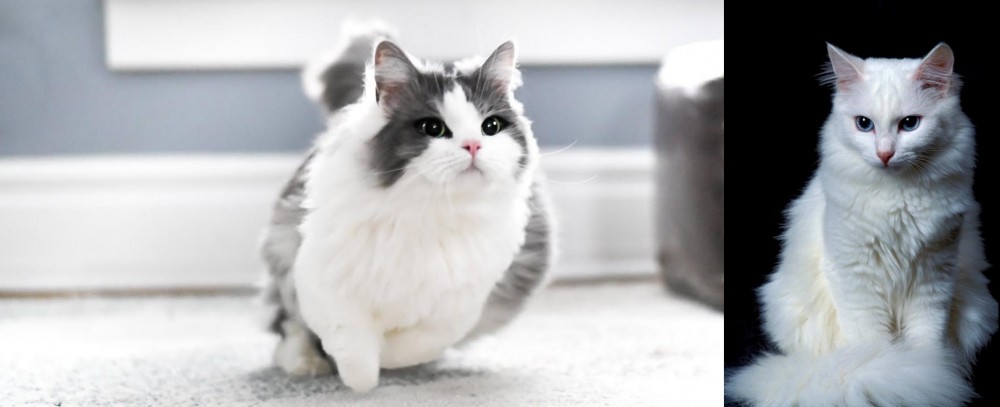 Munchkin is originated from United States but Turkish Angora is originated from Turkey. Both Munchkin and Turkish Angora are having almost same weight. Munchkin may live 3 years less than Turkish Angora. Both Munchkin and Turkish Angora has same litter size. Munchkin requires Low Maintenance. But Turkish Angora requires Moderate Maintenance
Munchkin is originated from United States but Turkish Angora is originated from Turkey. Both Munchkin and Turkish Angora are having almost same weight. Munchkin may live 3 years less than Turkish Angora. Both Munchkin and Turkish Angora has same litter size. Munchkin requires Low Maintenance. But Turkish Angora requires Moderate Maintenance
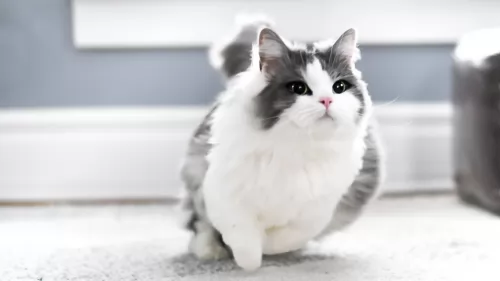 Information about the short-legged Munchkin cat has been around since the 1940s. A British veterinary report in 1944 noted these short-legged cats.
Information about the short-legged Munchkin cat has been around since the 1940s. A British veterinary report in 1944 noted these short-legged cats.
During the 2nd World War, the cats disappeared but other short-legged cats were seen in Russia during 1956 and then the United States in the 1970s.
The cat was introduced to the general public in 1991 but for many years it wasn't accepted in cat competitions. Eventually, the Munchkin was proposed as a new breed by foundation breeders and accepted by TICA into its New Breed development program in 1994. The Munchkin breed achieved TICA Championship status in May 2003. The Cat Fanciers Association doesn’t recognize the Munchkin.
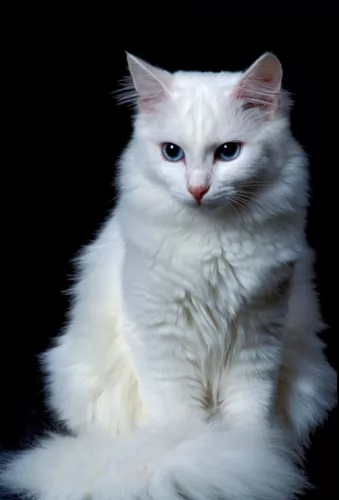 The Turkish Angora is a very old breed that naturally developed. It is thought that the breed developed in Turkey in the Ankara region formerly known as Angora.
The Turkish Angora is a very old breed that naturally developed. It is thought that the breed developed in Turkey in the Ankara region formerly known as Angora.
There are records that indicate that the Turkish Angora made an appearance in the UK as early as the 14th century already. Also, the beautiful longhaired cat was also introduced to the United States.
A breeding program was started for these cats in the early 20th century and it was then taken to Canada in 1963 and accepted as a championship breed.
While white was the only acceptable color at first, they now come in many different colors.
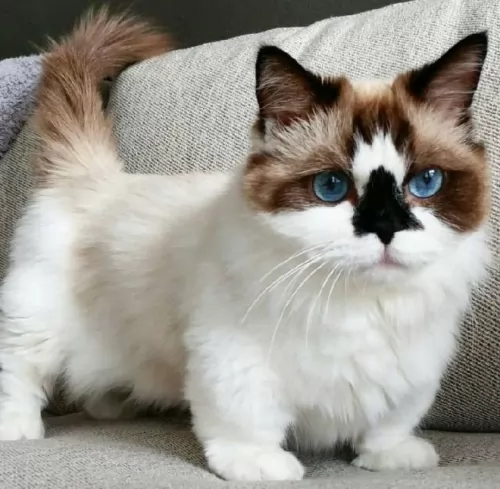 The Munchkin is a small to medium-sized, muscular cat with a thick coat that comes in all colors and patterns. In fact, color, pattern, and coat length will vary.
The Munchkin is a small to medium-sized, muscular cat with a thick coat that comes in all colors and patterns. In fact, color, pattern, and coat length will vary.
There is also a long-haired variety. It usually weighs between 3 and 4kg. It has short, stubby little legs and a torso that hangs fairly low to the ground. The cat’s back legs are somewhat longer than the front legs. The legs of these cats can be slightly bowed. The eyes can be any color.
The Munchkin is such a social, outgoing cat that just loves being petted and pampered by his human family. He is sociable and friendly as well as intelligent and is easy to train. While he is an amicable cat and can get on well with everyone in the family, it isn’t a good idea to have such a cat as a playmate for children as they can become injured.
An interesting feature with this cat is the way he doesn’t really sit like other cats but has a way of sitting up on his legs, much like a rabbit.
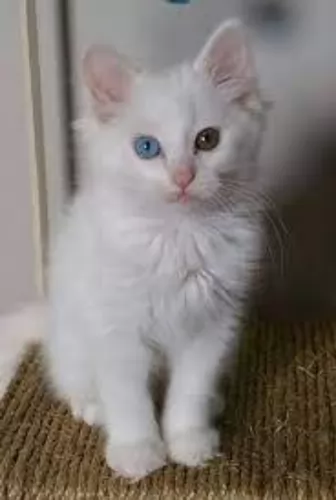 This is a medium-sized, muscular cat that can weigh between 3 and 6kg. It is a long-haired cat and the single coat has no undercoat.
This is a medium-sized, muscular cat that can weigh between 3 and 6kg. It is a long-haired cat and the single coat has no undercoat.
While the Turkish Angora is essentially white, its coat can come in a number of other colors.
The cat’s body if firm and fairly long, the legs are long with the hind legs being longer than the front legs, The tail is long and plumed, the head has large fairly pointed ears that can have tufts of fur. The eyes are large and almond-shaped and slant somewhat upwards. The color of the eyes can be blue, green, gold, amber.
This is a very active, athletic cat and he likes nothing more than to leap up on to high perches to survey his surroundings. They are intelligent, affectionate cats and they seem to gravitate towards one special human family member.
The cat is also protective of his human family. If any family member wants to stroke and pet them, they are absolutely delighted, just lapping up the attention.
They are smart enough to learn a few tricks too. They aren’t vocal cats but are sweet and quiet as well as being affectionate, making them perfect companions.
They don’t do well with changes, and a sudden change in his lifestyle can be upsetting for him.
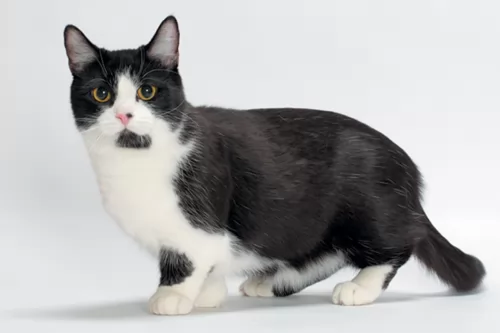 The Munchkin may be short and stock but he is just as active and playful as any other cat. When you have him in your home, you'll discover that his short little legs don't stop him from trying out everything other cats do.
The Munchkin may be short and stock but he is just as active and playful as any other cat. When you have him in your home, you'll discover that his short little legs don't stop him from trying out everything other cats do.
He is ready to show you what he's made of. He is a confident, social cat and is friendly, intelligent, and loving towards his human family. He makes a devoted companion and he will get along with other cats in the family as well as dogs.
He may be a bit odd to look at but if you want an excellent companion, the Munchkin is well worth your consideration.
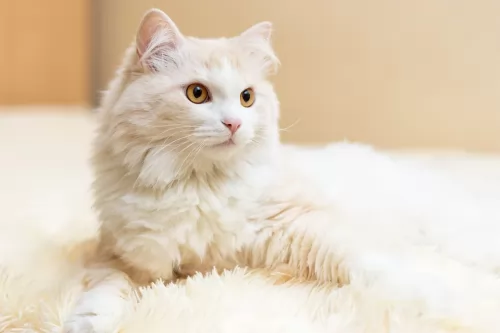 Beautiful to look at, this cat has got all the characteristics that make him a wonderful pet. He is playful well into adulthood and will love an assortment of stimulating toys to be amused by.
Beautiful to look at, this cat has got all the characteristics that make him a wonderful pet. He is playful well into adulthood and will love an assortment of stimulating toys to be amused by.
He is a sociable breed and doesn’t enjoy being left alone for hours. It would be far better to have another feline friend to keep him company.
Active and entertaining, you’ll be amused by your Turkish Angora and be so glad that you made the decision to bring such a charming creature into your home and heart.
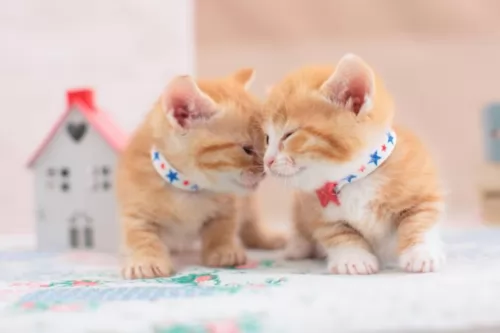 Because this is a fairly new breed, it's still not too clear about its health. It was once thought that the Munchkin cat could develop spinal problems because of its short legs.
Because this is a fairly new breed, it's still not too clear about its health. It was once thought that the Munchkin cat could develop spinal problems because of its short legs.
It was in 1995 that some breeders had some of their older Munchkins x-rayed to see if there were any signs of joint or bone problems, but none were found.
The Munchkin cat should also be vaccinated as a kitten and be treated for parasites. To ensure the good health of your sweet little Munchkin cat, give him the best diet possible.
In fact, if you take good care of your Munchkin and you make sure to get all the necessary vaccines for him and get him to the vet when he shows signs of illness, your munchkin can reach 12 to 15 years of age.
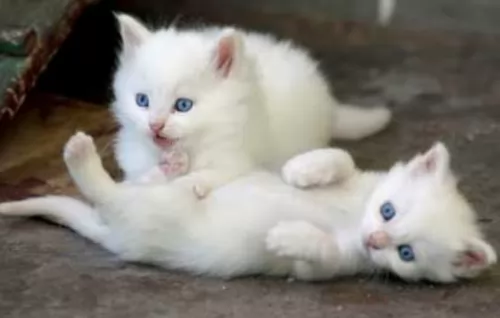 Turkish Angoras are generally healthy, but white cats with blue eyes can be prone to deafness. It is the W gene that is responsible for the white coat and blue eyes. Unfortunately, the presence of a blue eye can indicate deafness in the cat. But there are these cats that have 2 blue eyes and they have normal hearing.
Turkish Angoras are generally healthy, but white cats with blue eyes can be prone to deafness. It is the W gene that is responsible for the white coat and blue eyes. Unfortunately, the presence of a blue eye can indicate deafness in the cat. But there are these cats that have 2 blue eyes and they have normal hearing.
Another problem that has been seen in this beautiful cat breed is Ataxia which is a deadly neuromuscular disorder.
The most common sign of ataxia is an abnormal way of walking and the cat is actually unsteady on his feet. Sometimes the feet can even drag on the ground. Thankfully, screening has reduced the incidence of the disease.
Also, watch out for hypertrophic cardiomyopathy, a kind of heart disease that causes the heart muscle to enlarge.
Just remember that with a cat, diet can also play a huge role in the health of a cat. Your furry friend needs the right meaty foods with the right balance of nutrients to remain healthy and strong.
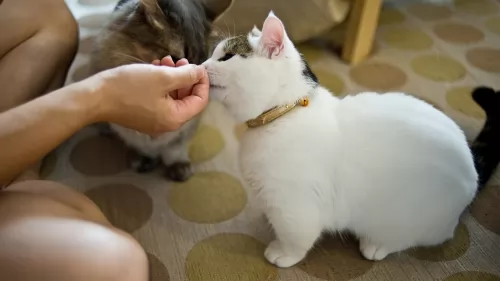 Every cat is unique and the Munchkin is a unique cat, This little cat is a carnivore just like any other cat and his diet must be made up mostly of protein.
Every cat is unique and the Munchkin is a unique cat, This little cat is a carnivore just like any other cat and his diet must be made up mostly of protein.
Speak to your vet about the best food for your Munchkin because a kitten will require a different diet to a senior Munchkin. Also, you don’t want your Munchkin to put on too much weight as this can be detrimental to his joints.
Not only that, being overweight comes with all kinds of health issues. The manufacturers of commercially manufactured cat foods have made sure that they have brought out foods for every stage of a cat's life and age.
Munchkin cats will need to have their fur brushed at least once a week. Trim the claws at the same time.
Provide your sweet little Munchkin with a litter box and keep the litter box immaculately clean, removing the feces every single day.
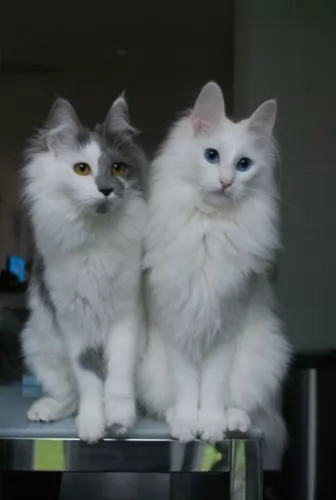 The Turkish Angora has a single coat and the lack of an undercoat makes it easy to brush him and keep the coat soft and silky. Also, the coat is only fully developed when the cat is about 2 years old.
The Turkish Angora has a single coat and the lack of an undercoat makes it easy to brush him and keep the coat soft and silky. Also, the coat is only fully developed when the cat is about 2 years old.
Check the inside of the ears. You may not want to clean them out yourself as you have to be very careful not to damage the ears. The vet and cat groomers can help you with this.
Keep your Turkish Angora’s litter box spotlessly clean. Cats are very particular about the cleanliness of their litter box and the feces will need to be removed every single day.